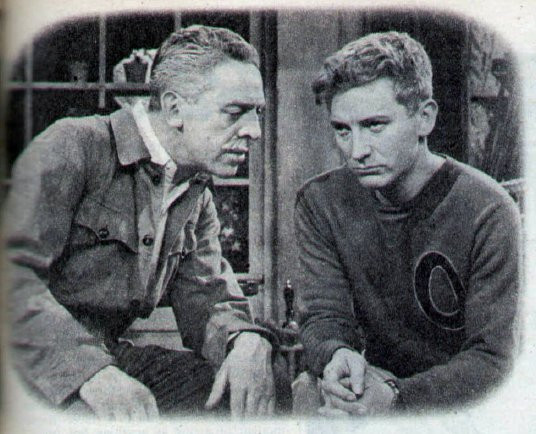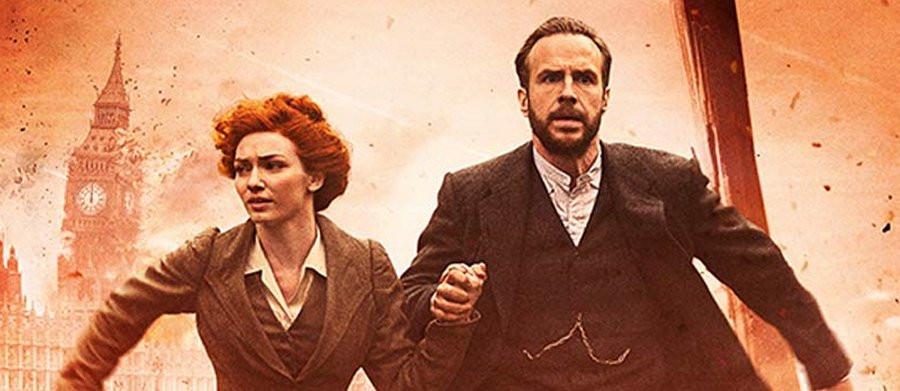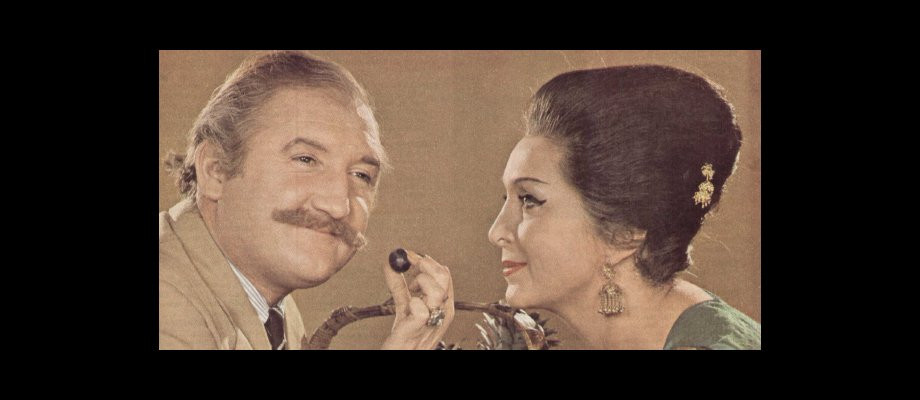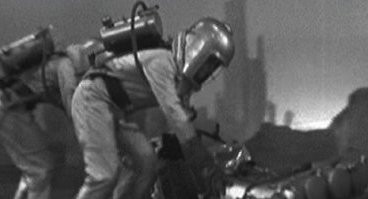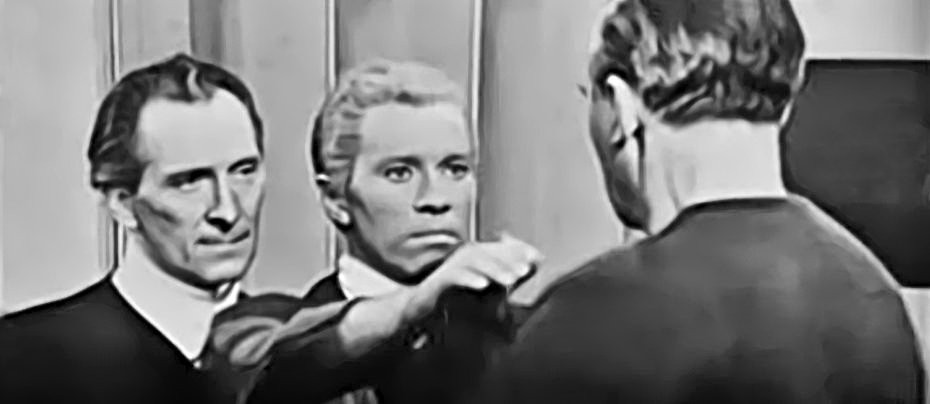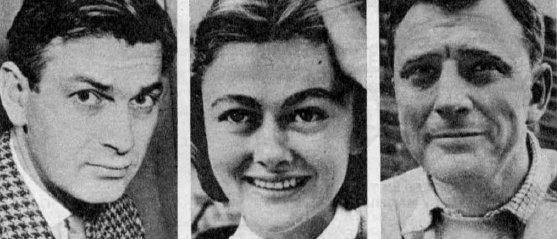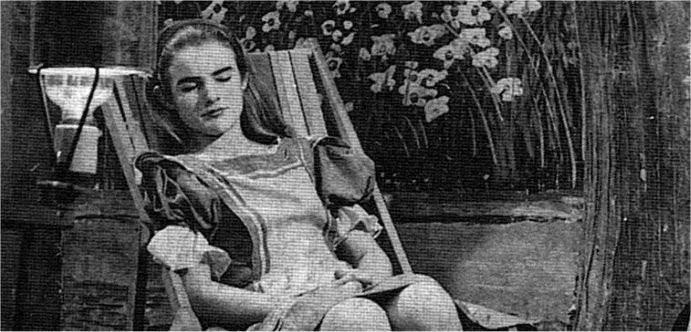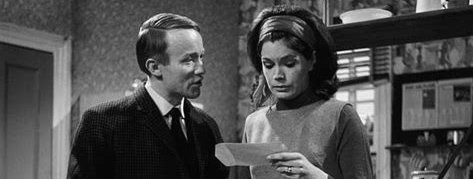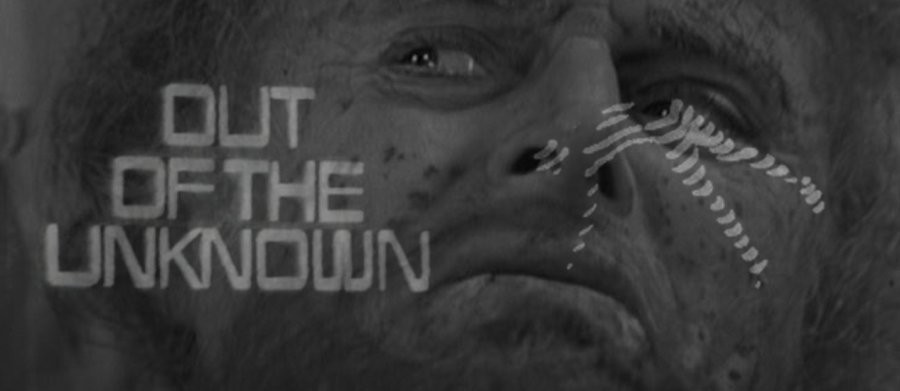
Out of the Unknown: Some Lapse of Time
One of the strongest episodes of Out of the Unknown's first series, “Some Lapse of Time” was adapted by Leon Griffiths from John Brunner's short story of the same name. While not as well remembered as the likes of Isaac Asimov, Robert Sheckley or John Wyndham, who all had stories adapted for the series, Brunner is a celebrated figure in science fiction literature. His best known work, Stand on Zanzibar, was published in 1968, three years after this episode was broadcast. Nonetheless, Brunner had been writing novels and stories since the 1950s, and was already well-established by the time Irene Shubik began searching for stories to adapt to scripts. While his work spans many genres, it is for his science fiction that he is best known, much of which take a rather pessimistic look at the near future.
“Some Lapse of Time” was originally published in a magazine in 1963, before being reprinted for a larger distribution in the collection Now, Then! in 1965. As such, it was practically brand new when adapted for the screen, and while the original story shares the plot and haunting atmosphere of the episode, Griffiths cuts out a lot of the drag in his adaptation. This is a pretty fast-moving episode by 1960s BBC standards, the tempo maintained by the main character's rapid collapse.
The episode begins with a nightmarish vision, haunting the protagonist Dr. Max Harrow. Cave men dressed in ragged skins dance around a fire, while a child cries in the background, before a diseased man's face leers into the shot, laughing in the face of the sleeping and terrified Harrow. It's a genuinely unsettling opening to an episode, and one of those times when black-and-white footage is a definite positive, since it renders the imagery all the more unreal.
Harrow has lost his two-year-old son to a rare disease called heterochylia, which renders the body unable to metabolise fats. The disease is caused by a genetic mutation that is the result of background radiation from the nuclear testing. This was the early 1960s, after all; the threat of nuclear weaponry and its subsequent fallout was an ever-present fear. Harrow is filled with anger at the world that killed his son, racked by nightmares, and puts his energy into his work, specialising in radiation-based diseases at a research hospital. His marriage has begun to suffer, and the strain is showing; he flies off the handle when the Minister for War is fast-tracked for treatment for a minor complaint.
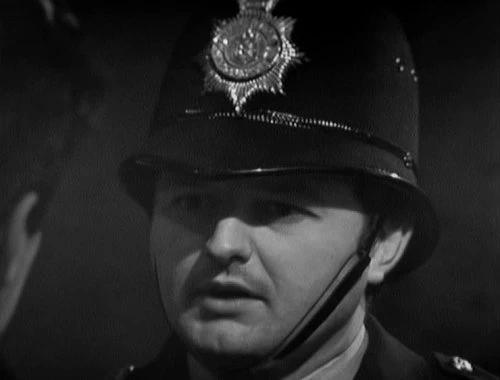
Out of nowhere, a policeman knocks on his door in the middle of the night, bringing in a filthy tramp in a state of sickness and confusion. The man (John Gabriel), later to reveal his name as Smiffershon, collapsed outside the Harrows' door. Examining him, Harrow deduces that the vagrant is suffering from heterochylia, something which is impossible. Not only should he never have reached adulthood with such a condition, but there was the radiation levels when he was born couldn't have been enough to cause the mutation. Harrow is presented with a mystery: how can this man exist, and how could he seek out the one man who specialises in such a disease?
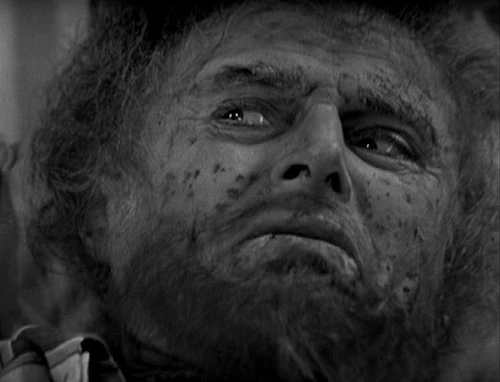
Smiffershon is clutching a human finger bone in his hand, carries a flint knife, and is riddled with radiation. The mystery deepens further as Smiffershon wakes up and begins to talk, in an incoherent, nonsense language. The hospital brings in a philologist, Dr. Laura Denville, played by the attractive Delena Kidd, to decipher Smiffershon's ramblings. Adding another mystery, it seems that he's actually speaking English, albeit English after centuries of linguistic drift, which is, of course, impossible. The presence of Dr. Denville only makes things worse for Harrow, though, as his wife Diana (Jane Downs) immediately jumps to the wrong conclusion and accuses him of having an affair. The ensuing argument ends with Diana slamming her car door on Harrow's little finger, severing the upper finger bone – the very bone that Smiffershon was carrying.
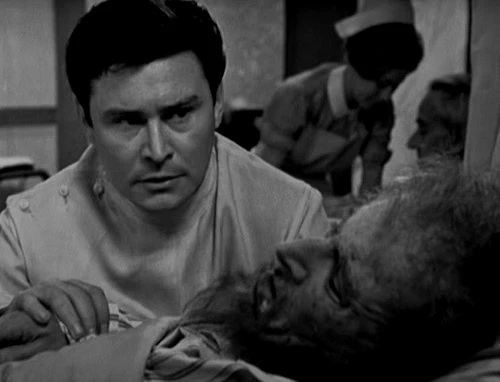
Harrow is played by Ronald Lewis, later to become better known for the roles of Rupert Sherwin in His and Hers (1972) and Peter Thresher in The XXY Man (1977). By 1965 he had already become a familiar face on television, particularly for viewers of Armchair Theatre (1956-70) in which he played many roles. He'd be back for one more go on Out of the Unknown the following year with “Lambda 1.”
Lewis puts everything into his performance as Harrow, a man already cracking under the strain of his life when the episode begins. As the episode progresses, his stress increases, with Lewis turning up the dial on his performance with each new revelation. The final straw is the loss of his finger, which finally joins the dots for him, and he fully recognises Smiffershon as the man who's been terrorising him in his dreams. Harrow completes his inevitable descent into madness, and Lewis's performance crosses from intense to over-the-top.
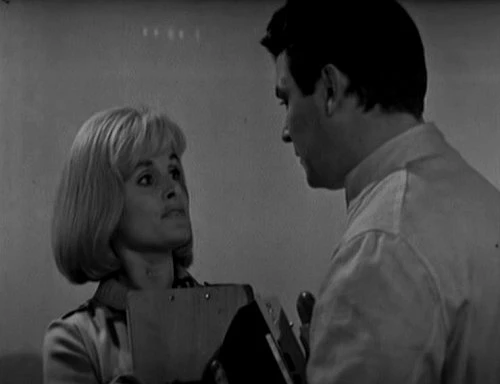
“Some Lapse of Time” has a strong central message: anti-war, anti-nuclear. It's very much of its time, and on this side of the Cold War, seems a little archaic. Nonetheless, while a nuclear winter may no longer seem to be the likeliest cause, environmental collapse remains a frightening promise of the future. What could be a dry lesson on the risks of the nuclear age is given power by the supernatural elements of the story. Smiffershon's inexplicable presence, perhaps a warning from the future, perhaps something else, pushes this story from straight science fiction to the fantastic.
The tense direction by Roger Jenkins, the nightmarish visions and the ever-increasing anxiety of Lewis's performance makes this one of the strongest Out of the Unknown episodes. Another, very different John Brunner story, “The Last Lonely Man,” would be adapted for the third season in 1969, while Leon Griffiths would adapt another story, “The Yellow Pill,” into a script in the same year. Of note also is the design credit for the episode: one Ridley Scott, who would go to become rather more successful than anyone else involved in the series.
About the Writer of this article, Daniel Tessier
Dan describes himself as a geek. Skinny white guy. Older than he looks. Younger than he feels. Reads, watches, plays and writes. Has been compared to the third, fourth, fifth, sixth, seventh, eighth, tenth, eleventh and twelfth Doctors, and the Dream Lord. Plus Dr. Smith from 'Lost in Space.' He has also had a short story published in Master Pieces: Misadventures in Space and Time a charity anthology about the renegade Time Lord
Dan's web page can be here: Immaterial
Published on November 22nd, 2019. Written by Daniel Tessier for Television Heaven.


